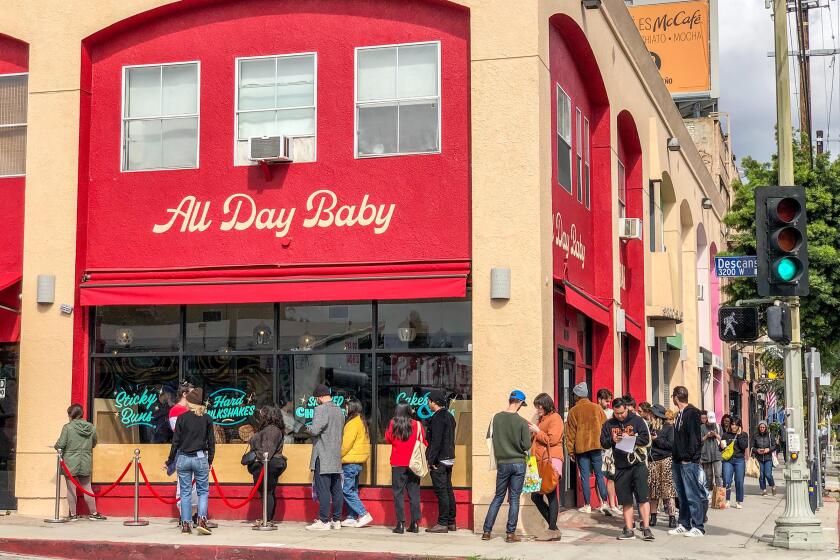Market Watch: Above the ocean in Malibu, a rare orchard of loquats
- Share via
High on a steep, terraced mountainside in Malibu, with a spectacular view of the Pacific, perches the largest and probably the only commercial planting of loquats in the United States. A pome fruit related to apples and pears, the loquat is one of the great pleasures of spring in Southern California. It has firm but juicy flesh with the texture of cantaloupe and a sweet-tart flavor evoking cherry. The irony is that it is so well-adapted and common as a backyard tree that there’s little local demand for the fruit.
“They grow almost like weeds here, so people won’t spend money on them,” says Dwight Landis, 64, who ships his fruit around the country but found it didn’t pay to sell through farmers markets. As a result, despite its uniqueness and proximity, his farm has stayed below the radar of local foodies.
Landis was born in Inglewood and earned degrees in mechanical engineering from Loyola University and Caltech. In 1978, he and his wife, Christine, started a business that makes air sampling equipment, and they began buying 50 acres of raw land in Malibu about a mile from the ocean. He planted avocados to make use of the property, and a few years later, after he had tasted loquats in a Chinese American colleague’s garden in Thousand Oaks, he put in a modest orchard.
“They tasted good, and hardly anyone else was growing them, so I said, ‘Let’s try it,’ ” he recalls, sounding gently bemused.
Landis thought the trees he bought from a nursery were a classic variety, Gold Nugget, which is supposed to be large, with thick orange flesh, but he ended up with small fruits and thin, yellowish pulp. He therefore grafted over the trees to his Thousand Oaks friend’s selection, which is round to slightly pear-shaped, medium-sized and orange, with a well-balanced flavor. The true name of his variety, if there is one, remains unknown.
The varietal confusion is not surprising for a fruit that has been almost entirely neglected by American farmers and scientists. In China, where loquats are native and grow wild in mountain forests, the fruit is cultivated on about 300,000 acres, and there are hundreds of varieties. Some of them, natural triploids with three sets of chromosomes, are seedless and large-fruited; others are red-fleshed or ever-flowering. Undoubtedly, some of these could revolutionize loquat cultivation in the United States, but our National Plant Germplasm System, which collects and preserves fruit varieties, doesn’t have even a single loquat variety. Most of the modest domestic demand for fruit is supplied by imports from Spain, Israel and Chile.
It might have been different. A century ago, promoters touted the loquat as a promising new crop for Southern California, and local growers took the lead in developing new varieties like Advance and Champagne. For a few decades, the loquat seemed like a contender, but the delicate fruit proved poorly adapted to the American industrial fruit distribution system, where shelf life and appearance rule. As delicious as it is just off the tree, the fruit bruises easily when jostled at the store and can lose its acidity after a week or two so that it becomes insipid. The loquat’s trump card, that it was virtually the only soft fruit available in late April and early May, has become less valuable in recent decades with the influx of imported fruits, the breeding of earlier varieties of stone fruit and plantings of stone fruit in ultra-early areas such as northern Mexico and Arvin, Calif.
Landis has managed to make loquats pay but has faced plenty of challenges in production, including voracious deer, sunburned fruit and fire blight. Although loquat trees are fairly hardy, they are labor-intensive to prune and harvest. Marketing is no cinch, either: Partly because the fruits require time to peel and deseed, there’s limited demand for them, mostly from customers of Asian and Mideastern origin.
“Most Americans don’t want to mess with loquats,” says Landis.
The Landis Ranch loquat season typically runs from late April to early June. Landis sells through a downtown wholesaler, Tazza Produce, to stores around the Los Angeles area, including Farmers Ranch, Encino Glatt, Valley Produce and Q-Market in the San Fernando Valley; Armen Market in Glendale; Elat and Livonia Glatt markets on Pico Boulevard, south of Beverly Hills; and Benny Market in Westlake.
The trick in choosing loquats is to find fruit of a good variety, picked fully ripe and fresh off the tree so that it has a good balance of sweetness and acidity, and an intense, pleasant flavor. Over-irrigation or recent rains can dilute the flavor. There’s no sure bet, however, since fruit of equal ripeness from the same tree can vary markedly in quality. Backyard fruits from seedling trees can be very tasty but are sometimes small and seedy, and hardly worth the trouble to eat. Don’t disdain fruits with minor scuffs and bruises, which are often the tastiest.
Loquats are readily available at farmers markets in season, although no vendor has more than a few trees. Look for fruit from Sycamore Hill Ranch of Fillmore at Santa Monica on Saturday and in Hollywood; Rancho Mexico Lindo of Valley Center at Beverly Hills; Mud Creek Ranch of Santa Paula at Hollywood and Santa Monica on Wednesday; Thys Farms of Fallbrook at Torrance; and Elsie Nazarro of Riverside at Riverside Sears.
More to Read
Eat your way across L.A.
Get our weekly Tasting Notes newsletter for reviews, news and more.
You may occasionally receive promotional content from the Los Angeles Times.










